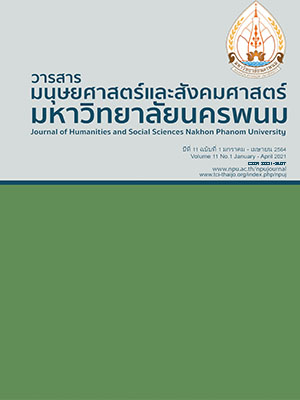Developing Sustainable Transcendental Leadership Characters for Effecting Job Satisfactions and Organization Commitments of Personnel Education Administration
Main Article Content
Abstract
The objectives of this study aimed to develop the sustainable transcendental leadership characters, and study to the relationship of sustainable transcendental leadership characters towards job satisfactions and organization commitments of personnel education administration from 2 groups including Key informant and samples, for key informant as directors, voice directors of Secondary education service area office, 25, 26, and schools directors a total of 18 persons, they all were by purposive sampling, the samples including the directors, voice directors of secondary education service area office in 25, 26, schools directors and teachers a total of 790 persons, they all were by multistage random sampling. The collection came from documentary study, brainstorming and participatory action learning, in-depth interviews by interview questionnaire, include to survey by questionnaire. The data analysis of qualitative data was analyzed by using three main stages, i.e., data reduction, data organization, data interpretation to conclusion. The quantitative data was analyzed by descriptive statistical analysis including mean, standard deviation, Confirmatory Factor Analysis (CFA), and correlation coefficient (r). The findings showed that the factors of sustainable transcendental leadership characters as leadership spirits, visions, morals and ethics, pursuing services, and leader competencies, to consistent with empirical data of statistical significance at the levels of .01. And the relationship of sustainable transcendental leadership characters towards job satisfactions and organization commitments of personnel education administration have to positive relationship of statistical significance at the levels of .01., from to knowledge create and understanding with the personnel education administration to adaptation and working of effectiveness.
Article Details
References
Cardona, P. (2000). Transcendental leadership, Leadership & Organization Development Journal. 21 (4), pp. 201-207.
Charnnarong. J. (2014). Watthanatham ongkān rabop rātchakān khwām mēttā læ khunnaphāp chīwit kānthamngān [Organization Culture, Bureaucracy Kindness and quality of work life]. Bangkok : Dhurakij Pundit University.
Chen, Yongxia, Jia, Liangding and Li, Chaoping et al.. (2018). Reforming Leader, Psychological Empowerment, and Employee’s Organizational Commitment: Empirical Research in China. Management World. No.1. P.96-105.
Cook, J. D., and Wall, T. D. (2016). New work attitude measures of trust, organizational commitment and personal need non-fulfillment. Journal of Occupational and Organizational Psychology, 53,pp. 39–52.
Cronbach. (1970). The evolution of research. Michigan : U.S.A. Duang Mataphon. W. (2014). Development of Superior Leadership Indicators for Basic Educational Institution Administrators. Under the provincial administration organization (Doctor's thesis). Loei Rajabhat University, Graduate School, Educational Administration Major.
Jedaman. P. (2019). phāwa phū nam chœ̄ngkon yut nai satawat thī yīsipʻet phư̄a kān plīan phān kānbō̜rihān čhatkān sưksā 4.0 yāng yangyư̄n [Strategic Leadership in 21st Century for Transition of Education Management 4.0 to Sustainable]. Journal of Rajabhat Mahasarakham University. 13 (2), May- August, pp. 27-35
Liu, C.H. (2007). Transactional, Transformational, transcendental leadership : Motivation effectiveness and measurement of transcendental leadership. University of Southern California.
Masintree. K. (2015). yutthasāt læ kanpatirū sū kān pen thailǣn sī . sū [Strategy and Reform to Thailand 4.0]. Bangkok, Thailand: Ministry of Education. The office.
Northouse, P. G. (2016). Leadership : Theory and practice. New York : SAGE.
Northouse, P. G. (2010). Leadership: Theory and practice. 5th ed. Thousand Oaks : SAGE.
Office of the Education Council, Ministry of Education. (2017). nayōbāi læ yutthasāt kānphatthanā khunnaphāp kānsưksā [Policy and strategy development of education Quality]. Bangkok, Thailand: Ministry of Education. The office.
Phongsriwat.S.(2014).Phāwa phū nam bǣp nư̄a chan [Transcendental Leadership].[Online]. http://suthep.crru.ac.th.
Sanders, J.E., Hoppkins, W.E., and Geroy, G.D. (2019). From transactional to transcendental: Toward and integrated theory of leadership. Journal of Leadership & Organizational Studies, 9(4)21-31.
Srisa-art. B. (2010). kānwičhai bư̄angton [Preliminary Research]. Bangkok, Thailand: Phiriyasan.
Strack and Fotter. (2002). Spirituality and effective Leadership in healthcare : is there a Connection. Frontiers of health service management, 18(4), pp. 3-18.
Sukkamart. A., Jedaman. P., and Others. (2017). phāwa phū nam bǣp yangyư̄n nai satawat thī yīsipʻet phāitai krō̜p kānsưksā prathēt Thai 4.0 [The 21st Century of Sustainable Leadership under Education Thailand 4.0 Framework]. Journal of Industrial Education. 16(2), May- August, pp. 1-7.
Yukl, G. A. (2018). Leadership in Organizations. 8th Edition, Prentice Hall, Upper Saddle River.


